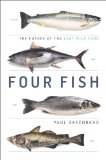
Critics' Opinion:
Readers' rating:
Published Jul 2010
304 pages
Genre: Science, Health and the Environment
Publication Information
Our relationship with the ocean is undergoing a profound transformation. Whereas just three decades ago nearly everything we ate from the sea was wild, rampant overfishing combined with an unprecedented bio-tech revolution has brought us to a point where wild and farmed fish occupy equal parts of a complex and confusing marketplace. We stand at the edge of a cataclysm; there is a distinct possibility that our children's children will never eat a wild fish that has swum freely in the sea.
In Four Fish, award-winning writer and lifelong fisherman Paul Greenberg takes us on a culinary journey, exploring the history of the fish that dominate our menus - salmon, sea bass, cod and tuna - and examining where each stands at this critical moment in time. He visits Norwegian mega farms that use genetic techniques once pioneered on sheep to grow millions of pounds of salmon a year. He travels to the ancestral river of the Yupik Eskimos to see the only Fair Trade certified fishing company in the world. He investigates the way PCBs and mercury find their way into seafood; discovers how Mediterranean sea bass went global; Challenges the author of Cod to taste the difference between a farmed and a wild cod; and almost sinks to the bottom of the South Pacific while searching for an alternative to endangered bluefin tuna.
Fish, Greenberg reveals, are the last truly wild food - for now. By examining the forces that get fish to our dinner tables, he shows how we can start to heal the oceans and fight for a world where healthy and sustainable seafood is the rule rather than the exception.
"Starred Review. Hugely informative, sincere and infectiously curious and enthusiastic." - Kirkus Reviews
"In this unusually entertaining and nuanced investigation into global fisheries, New York Times seafood writer Greenberg examines our historical relationship with wild fish." - Publishers Weekly
"A well-written book in the crucially important 'fish-in-danger” genre.'" - Library Journal
"Finally we have learned that food is best when produced on a small scale in accordance with the rhythms of our planet. Paul Greenberg's warm and witty Four Fish takes this concept to the ocean. Seafood deserves the same kind of respect and political awareness as food from the land. Maybe more." - Alice Waters
"Four Fish is not only the best analysis I've seen of the current state of both wild and farmed fish - it's a terrific read." - Mark Bittman, author of How to Cook Everything and Food Matters
Reading Guide Questions
Discussion questions written by Kenneth Mason Reiss Jr.
This information about Four Fish was first featured
in "The BookBrowse Review" - BookBrowse's membership magazine, and in our weekly "Publishing This Week" newsletter. Publication information is for the USA, and (unless stated otherwise) represents the first print edition. The reviews are necessarily limited to those that were available to us ahead of publication. If you are the publisher or author and feel that they do not properly reflect the range of media opinion now available, send us a message with the mainstream reviews that you would like to see added.
Any "Author Information" displayed below reflects the author's biography at the time this particular book was published.
Paul Greenberg's seafood writing has appeared in The New York Times, National Geographic, GQ, and many other publications. His 2005 New York Times Magazine article on Chilean sea bass received the International Association of Culinary Professionals' Award for excellence in food journalism, and he has received both a National Endowment for the Arts Literature Fellowship and a Food and Society Policy Fellowship.





The Funeral Cryer by Wenyan Lu
Debut novelist Wenyan Lu brings us this witty yet profound story about one woman's midlife reawakening in contemporary rural China.
Your guide toexceptional books
BookBrowse seeks out and recommends the best in contemporary fiction and nonfiction—books that not only engage and entertain but also deepen our understanding of ourselves and the world around us.